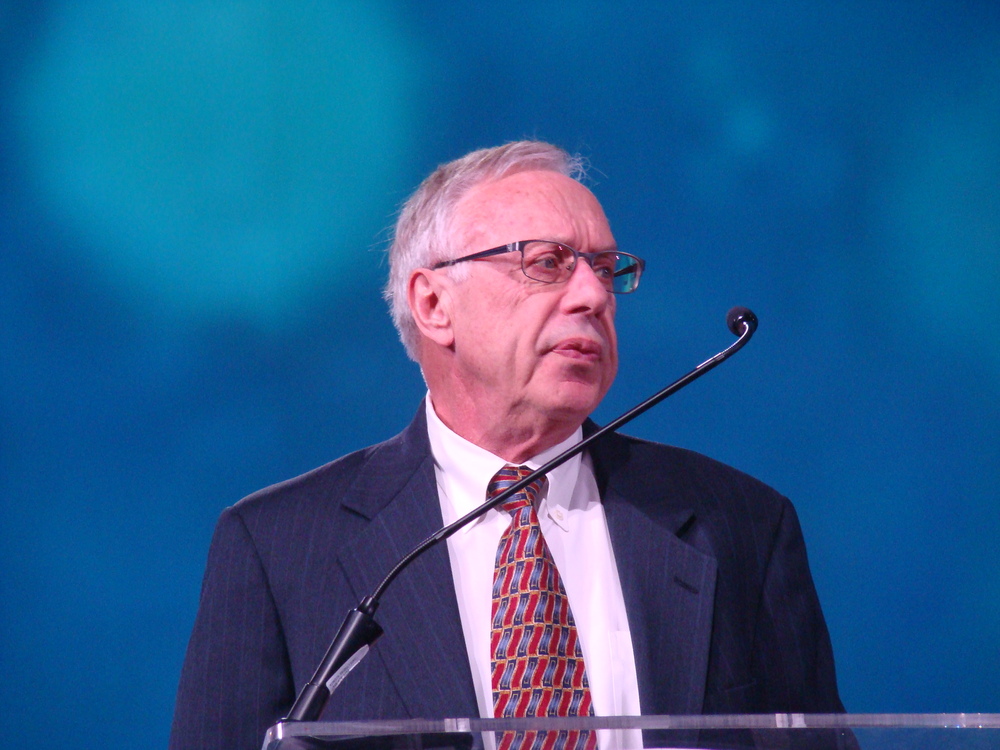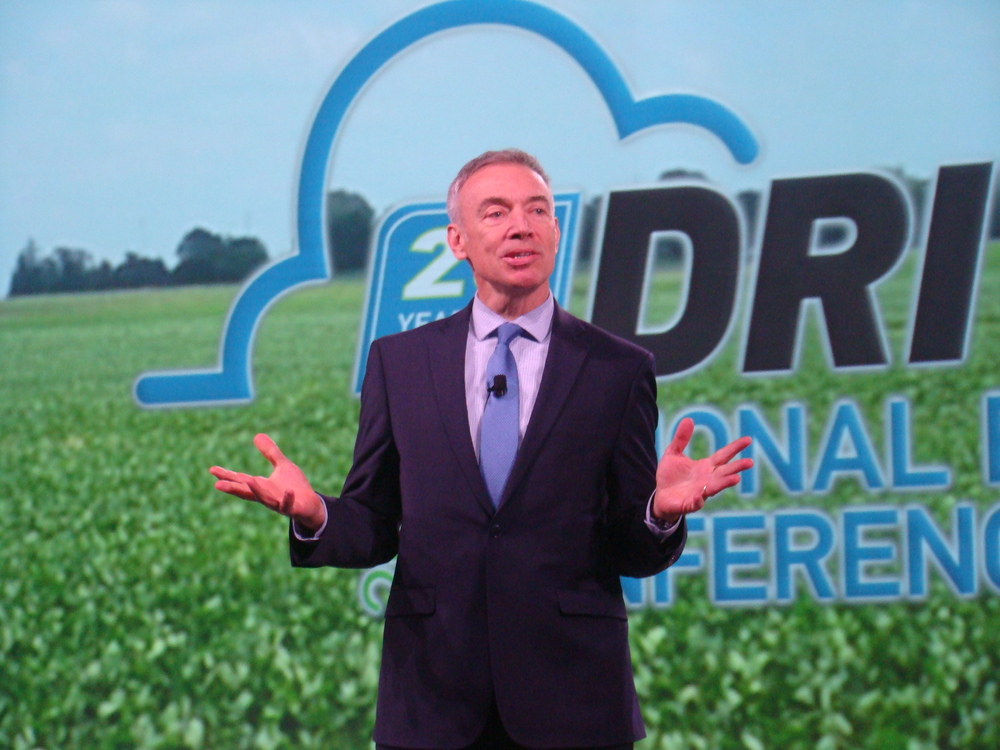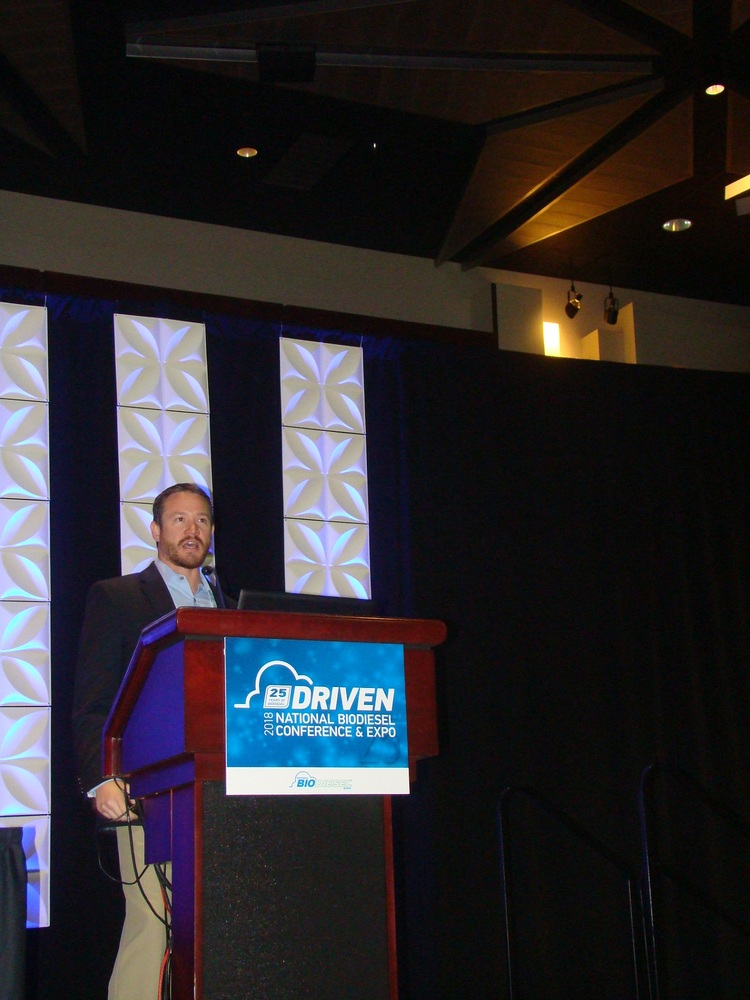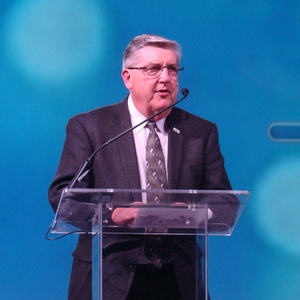Industry honors biodiesel champions, reflects on history





Photo: Ron Kotrba, Biodiesel Magazine
January 24, 2018
BY The National Biodiesel Board
As the U.S. biodiesel industry celebrates 25 years, the National Biodiesel Board’s annual awards recognize a diverse group of individuals and organizations who have made significant contributions to biodiesel. From long-time champions to present-day breakthroughs, the commercial biodiesel industry wouldn’t be where it is today without these individuals.
“The biodiesel industry has been built from visionary leaders all throughout our history,” said Donnell Rehagen, NBB CEO. “Reflecting on our relatively brief time as an industry reveals some truly remarkable achievements that serve as building blocks for where we are and where we intend to go. I’m proud to recognize this group of award winners as integral pieces of the biodiesel story.”
NBB recognizes the 2018 “Eye on Biodiesel” award winners in January at the National Biodiesel Conference & Expo. The honorees are:
Stephen Censky—Pioneer Award. Deputy Secretary, USDA
Advertisement
Advertisement
As the longtime CEO of the American Soybean Association, Censky was instrumental in the growth and advancement of biodiesel over the years. ASA’s primary focus as an organization is policy development and implementation of soybean farmer issues, including biodiesel. The organization, under Censky’s guidance as CEO from 1996 to 2017, played a critical role in passing the biodiesel tax incentive in 2005, and the inclusion of biodiesel in the revised Renewable Fuel Standard through their national network of farmer leaders and extensive grassroots advocacy power. As USDA deputy secretary, Censky continues to provide critical leadership on agricultural policies as he has done throughout his career. He has also served at USDA in the administrations of Presidents Ronald Reagan and George H.W. Bush, including as administrator of the Foreign Agricultural Service.
City of Seattle—Climate Leader Award
The city of Seattle is one of the leading biodiesel fleet users in America. Looking for ways to power their operations in a cleaner, more environmentally friendly way, city fleet directors turned to biodiesel for its carbon reduction benefits and ease of use. In 2014, the city enacted the Green Action Fleet Plan with a goal of reducing its carbon emissions by more than 40 percent by 2020. This began the use of B20 biodiesel blends. Seattle now uses nearly 200,000 gallons of biodiesel per year, significantly lowering its carbon emissions. Along with being an avid user of the fuel, the city also works proactively to educate other fleets that are interested in transitioning to biodiesel by attending and hosting workshops, speaking at national fleet and transportation events, and even partnering with NBB as a featured fleet in the 2015 national biodiesel advertising campaign. This role as a third-party validator is a critical piece of the puzzle to ensuring continued confidence in biodiesel.
Samuel P. “Pat” Black, III—Initiative Award. Founder and CEO, Hero BX.
Advertisement
Advertisement
With a vision to help revitalize Erie, Pennsylvania, with a return to a booming manufacturing sector, Black founded Lake Erie Biofuels doing business as Hero BX in 2005. Hero BX bears witness to the commitment of Black to investing, creating and managing companies with innovative products to capitalize on economic opportunities in the Lake Erie region and beyond with a focus on the creation of manufacturing jobs. He envisioned a company that would create meaningful jobs, spur technological innovation and produce ecofriendly products. Hero BX is the largest biodiesel plant in the Northeastern U.S., and it operates a production facility in Moundville, Alabama, and a blending and distribution terminal in North Hampton, New Hampshire. November marked the 10-year anniversary of the first production batch at the Erie plant and was celebrated across the Hero BX family. This year, Black combined his philanthropic mindset with his passion for biodiesel and commissioned a book, The Biodiesel Solution, to help bring the biodiesel story to a mainstream audience and capture the early history and numerous achievements of the industry as a collective.
Mike Youngerberg—Impact Award. Director of Product Development and Commercialization, Minnesota Soybean
Since 1986, Mike Youngerberg has worked to advance soybean industry priorities as a member of the Minnesota Soybean Research and Promotion Council and the Minnesota Soybean Growers Association staff. He has a passion for biodiesel and currently serves as the executive director of the Minnesota Biodiesel Council, which represents the biodiesel producers and feedstock providers in the state. Youngerberg has served in a critical role in one of the most proactive biodiesel states in the country. In 2002, Minnesota passed landmark legislation requiring that diesel fuel sold in the state contain at least 2 percent biodiesel. The law was implemented on Sept. 29, 2005, becoming the first state to require biodiesel blends. The program increased to B5 in May 2009, to B10 for the summer months in July 2014 and is scheduled to move to B20 this May 1. This tremendous growth faced challenges every step of the way and wouldn’t have been possible without Youngerberg’s strong leadership.
Earl Christensen—Innovation Award. Senior Chemist, National Renewable Energy Lab
Confidence in biodiesel blends in the marketplace rely on sound scientific data. Christensen has been instrumental in conducting work related to biodiesel stability that has bolstered confidence in B20 by both original equipment manufacturers and end-users alike. In his role at NREL, he has led critical efforts to analyze the positive benefits of stability enhancing additives in pure biodiesel, as well as the positive impacts of re-additizing B100 whose oxidative reserve has gone down over time. His recent work showed all samples of current market B20 biodiesel blends meeting today’s ASTM specifications had a minimum simulated shelf life of at least one year, with many samples having simulated shelf life of over three years. With re-additization, values were extended to over four years. This work shows that with biodiesel meeting industry specifications, using the proper handling and storage practices, it is possible for B20 to be stored as long as, or longer than, petroleum diesel currently in the marketplace, potentially opening the door to new biodiesel markets where storage longer than one year is needed.
Related Stories
The U.S EPA on July 17 released data showing more than 1.9 billion RINs were generated under the RFS during June, down 11% when compared to the same month of last year. Total RIN generation for the first half of 2025 reached 11.17 billion.
The U.S. EPA on July 17 published updated small refinery exemption (SRE) data, reporting that six new SRE petitions have been filed under the RFS during the past month. A total of 195 SRE petitions are now pending.
European biodiesel producer Greenergy on July 10 confirmed plans to shut down its biodiesel plant in Immingham, Lincolnshire, U.K. The company temporarily suspended operations at the facility earlier this year.
Aemetis Inc., a renewable natural gas and biofuels company, announced on July 17 that its India subsidiary, Universal Biofuels, appointed Anjaneyulu Ganji as chief financial officer, effective July 17.
Avia Solutions Group, the world's largest ACMI (aircraft, crew, maintenance, and insurance) provider, has partnered with DHL Express to reduce greenhouse gas emissions from its international shipments using SAF.
Upcoming Events










